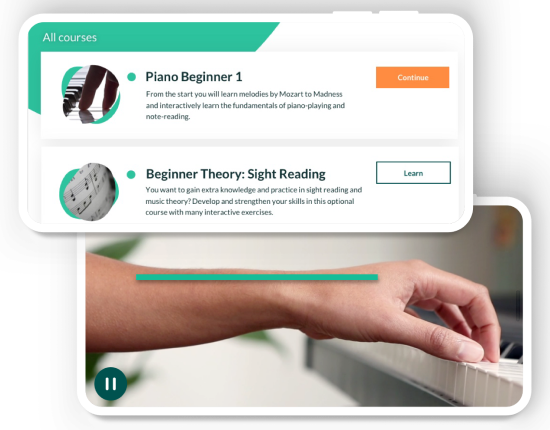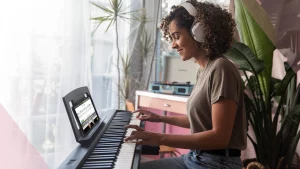Table of Contents
How does it make you feel if someone you know asked you to play the piano in front of an audience? Does the thought of it makes your hands start shaking and sweat start running down your back?
Be assured. It’s very normal and you’re not alone. It proves that you are a human, as this is a natural instinct embedded in us in times of stressful circumstances. Almost every musician goes through this. Some sources report 94% of orchestral professional musicians experience this before a piano audience. That’s practically every musician except for a few that neither has no emotion or just don’t give a crap, or they’ve been performing for years already.
Learn more about how professional musicians cope with performance stress.

Good news is this. Performance anxiety is a healthy thing and we can learn to use it to boost our performance. Yes, you read it right, it is possible and many musicians and performers learn to use it to their advantage. You can too.
Perhaps, you can already play a song or two, or you may have a small repertoire of music pieces already. Even if you’re just starting out, eventually, somebody you know might say “I heard you started playing the piano, how about you perform a piece at my birthday party?”.
It’s fine if you never want to play the piano to an audience. Just close your door and play for yourself. However, the greatest joy in music comes from sharing and playing with others. It’s definitely worth a try no matter how scary it may seem at first.
The key is not to attempt to overcome but to manage your anxiety and control your outcome.
Here are some tips to manage your performance anxiety and be better prepared to play the piano to an audience.

1) Be well prepared and tend to your repertoire often
This starts with knowing your song or a piece well and regularly play them, improving small amount every time. Practice correctly and have an excellent habit of practice. A good starting point for how to do so can be found in our post: The Art of Piano Practice.
Especially important in preparing for performance is knowing your most difficult passage, and spend a good amount of time becoming more comfortable with that tricky parts.
2) Perform your best pieces only
Even if you want to perform virtuoso pieces, if you’re not at that level, you’re asking for trouble to begin with. Know what you can play the best and pieces you feel most comfortable with. As you progress as a pianist, your repertoire will grow and you will add more pieces to your list of potential performance pieces. Eventually, that virtuoso Rachmaninoff piece can be on the list, but maybe not today. It’s totally fine to play a simple piece at the beginning and know that you don’t have to prove yourself to anybody. Music is about sharing the joy of sounds and certainly not a competitive sport.
3) Practice performing
Simulate a performance situation in your living room. Settle down on your bench at your piano, open your score book, take a deep breath and play the entire song through till the end. If you make a mistake, try to finish the piece and remind yourself that you are in front of people, even if you’re alone. Repeat this simulation often. With time, you will gain more confidence. What helped me the most in doing so is that after some time, I realized, I could save the performance even if I make a mistake and that it’s not the end of the world. It isn’t, and your loved one will not leave you because you played D instead of E on that one note.
Need to practice more? You can always go back to Skoove courses:
4) Start with a small audience first
If your first performance is at Carnegie Hall, you will have an incredible anxiety without a doubt. However, if your first performance is your loved ones, close friends, or your neighbors, one or two people you know, there’s a good chance you can pull it through well. If you have an anxiety for people, have your dog as your first audience. This sounds ridiculous but why not? There’s nothing wrong with practicing your performance that way. Gradually, you will begin to enjoy performing and have a few more people as audience. Eventually, performing at your friend’s birthday party seems like a routine.
5) Be focused and be calm
Be aware of how your body is reacting to the stressful situation. Take deep breaths and get in the “zone” – you and your piano is the only thing that exist in the universe during a performance. Never mind the noise and people around you, focus. Do your best at being calm and quiet internally. Settle down on your bench and feel firmly grounded.
6) Know your tempo well
The most common thing that happens with performance anxiety is that you play your piece way too fast and you stumble. That’s very common and happens to every musician at one point or another. What this tells you, is that you must know at which tempo you feel most comfortable to play the piece with. Quietly hum the beginning of the piece in your head, just as you know the song, and be conscious not to speed up during playing the piano to an audience, especially around that difficult passage in your piece. To work on that point, you can try practicing with a metronome!
You can learn to manage your anxiety by incorporating these tips. Try it and share your joy of music to the world, it’s a wonderful feeling!
Need some practice before your performance? Get back to Skoove courses!
Have fun performing!
More piano playing tips:
- Beginner tips for good piano posture
- 4 Tips to Learn Piano Effectively
- Learn to Read Piano Sheet Music Faster
Try out your free trial of Skoove today!














